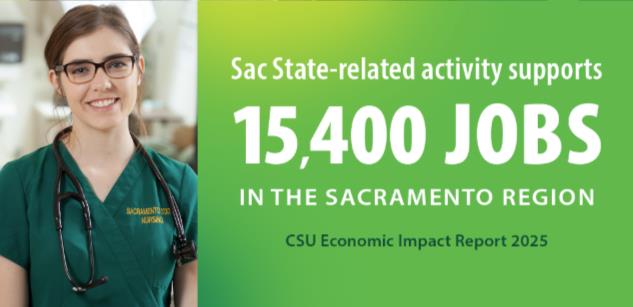November 18, 2025
Sacramento State and the CSU are economic and social mobility powerhouses, driving California’s economy while helping graduates create bright futures for themselves and their families.
The system, its 22 campuses , and hundreds of thousands of graduates continue to fuel California by building a diverse and educated workforce, a new report shows.
CSU’s Economic Impact Report, released Nov. 18. documents myriad ways that the system and each of its institutions benefits the state. It highlights the lasting return on investment that Californians reap from the nation’s largest and most diverse four-year public university system through industry activities, tax revenue, and employment.
Sac State, alone, helped generate a substantial economic impact in the Sacramento region, supporting a total of 15,400 jobs and an overall impact of $1.9 billion in industry activity—underscoring the campus’s vital role in regional economic vitality.
In addition, the report shows Sacramento State operations supported $737 million in wages earned and contributed $153.2 million in state and local tax revenue.
“The CSU has long been one of the state’s most powerful engines of economic mobility, opportunity, and innovation, and its influence extends across industries, communities, and generations,” said Sac State President Luke Wood. “At Sacramento State, we are proud to be part of that tradition of collective impact.”
The CSU supported more than 210,000 jobs across California during the 2023-2024 academic year, with Sac State supporting more than 16,000 of them, the report shows.
For every dollar the state invested in the CSU during that period, industry across California generated $7.69, a considerable return on investment that plays a key role in the state’s overall economic health.
The CSU awards nearly half of all bachelor’s degrees in the state, responding to California’s most urgent workforce needs in fields such as healthcare and technology.
CSU and Sac State graduates earn more, have better access to health care, and have lower rates of unemployment than those with only a high school degree, according to the report. Studies have shown that college graduates generally volunteer more, vote more, contribute more in taxes, and rely less on public services.
“Financial support of the California State University is not an expenditure, but a wise investment in our students and the communities and state we serve,” said CSU Chancellor Mildred Garcia.
Hornet alumni can attest to the value of a Sac State degree.
Rabbil Green, president of the University’s Alumni Association and manager for Career Development and Learning at SMUD, said Sac State has been part of his personal story since middle school, when he took part in programs like Academic Talent Search and Boys State.
“It prepared me for the workforce long before I had a title and continued to develop me as I taught at Sac State CCE, built my career, and eventually served on the Alumni Association board,” Green said. “Every step reinforced the same truth: Sac State creates leaders for the region.”
Another alum, Scott Syphax, CEO at Syphax Strategic Inc., said the University “functions as Sacramento’s talent engine.”
“Its graduates are in our hospitals, classrooms, boardrooms, and public agencies, keeping the local economy growing from the inside out,” Syphax said. “When Sacramento prospers, it is often because a Sac State alum is somewhere in the room helping to design, build, or lead what comes next.”
Garry Maisel, who graduated from Sac State in 1980 with an undergraduate degree in Finance, said the University is critical to the region’s economic success.
“A skilled workforce is the backbone of economic growth, and Sac State is key to educating and training that workforce,” said Maisel, CEO of Western Health Advantage.
Most Sac State graduates remain in the region, contributing to the area’s growth and vitality, noted alum Holly Tiche, principle in Tiche Consulting LLC.
“The ability to give local students access to higher education and keep that talent local after graduation is invaluable, and Sac State has been doing that for decades,” Tiche said.
“Sac State graduates impact our community, businesses, nonprofits and government every day in ways that continue to raise the profile of the University and the value of the degree we received.”
Alice Perez, who earned an undergraduate Business degree from Sac State, said the University does more than just educate residents and boost the economy.
“It also enriches the community by hosting cultural and educational events that enhance quality of life and attract tourism,” said Perez, who recently retired from AT&T as director of Legislative and Government Affairs.
“With its diverse student body and faculty, the University promotes inclusivity and strengthens the region’s social cohesion and competitiveness.”
Read more about the positive impacts of Sacramento State and the CSU on the Economic Impact web page.






